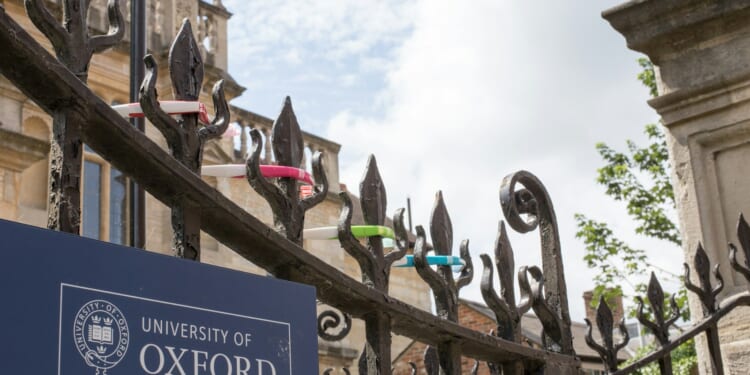Lord Hannan of Kingsclere was a Conservative MEP from 1999 to 2020 and is now President of the Institute for Free Trade.
Believe it or not, I feel sorry for George Abaraonye, the now-ousted president-elect of the Oxford Union. He put himself in an impossible position by his response to Charlie Kirk’s murder, and mine was one of the votes that ousted him (the tally, after three days of wrangles and challenges, was 1228 to 501, comfortably in excess of the required two thirds majority).
Still, social media have a way of freeze-framing our worst moments and inviting the world to judge us by them. I certainly wouldn’t want to be evaluated by the stupid things I said when I was 20. I was also unimpressed by the way self-proclaimed free speech warriors on the Right called for Abaraonye to be disciplined by his college or even by the police.
But he could not remain at the helm of an organisation dedicated to free expression. Kirk, let’s remember, was murdered while touring campuses under a sign inviting students to “change my mind”. Someone decided instead to shoot him dead, the bullet passing, with grisly symbolism, through his throat. If your immediate reaction is to cheer, you are the wrong person to run a debating society.
Abaraonye was slow to apologise, claiming at first that his views were less controversial than Kirk’s. Eventually, he declared that his intemperate remarks (“Charlie Kirk got shot, let’s fucking go” and “Charlie Kirk got shot loool”) “did not reflect my values”.
Well, maybe. Though I am reminded of something CS Lewis said in one of his wartime broadcasts:
“Surely what a man does when he is taken off his guard is the best evidence for what sort of a man he is? Surely what pops out before the man has time to put on a disguise is the truth? If there are rats in a cellar you are most likely to see them if you go in very suddenly. But the suddenness does not create the rats: it only prevents them from hiding.”
Abaraonye has the right to free speech. He can express whatever idiocies he likes without facing legal sanction. Equally, the Oxford Union has the right to free association, and can decide that he is no longer a suitable public face.
Another reason I feel a batsqueak of sympathy for Abaraonye is that he was caught out by the vibe shift. Had he expressed the same views at the height of the BLM madness in 2020, no one would have batted an eyelid. His supporters portrayed the campaign against him as having been got up by racists and are even now refusing to accept the result.
They blame the Returning Officer who, worn out by their behaviour, ended up excluding some of them from the count. Their statement contains the unintentionally hilarious line: “We equivocally deny that any representative appointed by George engaged in intimidating or disruptive behaviour.”
They also claim that, had the vote been confined to current students, he would have won. And, sadly, they are almost certainly correct. Which brings us to the underlying problem. The Oxford Union has gone off the rails. Obsessed with the need to “decolonise”, it will elect any candidate who is not white or who promises to smash the patriarchy.
The Union was never the bastion of white privilege that its young culture warriors imagine: a glance at the photographs on its walls suggests that, for most of the past century, its officers were less white than Britain as a whole. But it is now very difficult for a white candidate to be elected at all.
This trend reflects an altered electorate. Although no one will admit it on the record, several Oxford colleges are evidently subordinating meritocratic admission to DEI. Abaraonye himself is reported to have got in with A, B, B at A-level, well short of what is normally required.
At the same time, Oxford has many more international students, especially post-graduates. A deal with the Saïd Business School gives its students, 97 per cent of whom are from overseas, automatic Union membership. Nothing wrong with that: the students get a richer experience, and the Union badly needs the cash.
But it does skew the electorate. The term before last, for example, all four elected officers were Pakistani nationals. This term, there is more diversity: two Pakistanis, one Brit of Pakistani heritage and one Korean. Many of the debates are about niche foreign policy issues or about Palestine. This tends to put ordinary undergraduates off paying for membership, thereby skewing the electorate yet further and worsening the Union’s financial woes.
Can anything be done to break the cycle? The way to get more undergraduate members would be to let the Union include its brochure with the bumph sent to offer-holders. This used to happen, with the result that many students were given membership by family members who did not want to give them drinking money.
The ending of that arrangement, following a long campaign by the Oxford University Student Union (which envied the Oxford Union’s premises and complained that its name was confusing) marked the start of the Union’s decline. Perhaps the current Chancellor, William Hague, himself a Union hack in his time, might use his convening power to restore the old deal (with the Union, naturally, paying a fee for the service).
In the short term, some of the alumni who voted on Saturday might also back a restorationist slate of some kind – by which I mean candidates who value the history and traditions of the Union. If you have life membership, make a note of the date of Friday of Seventh Week: 28 November.

















